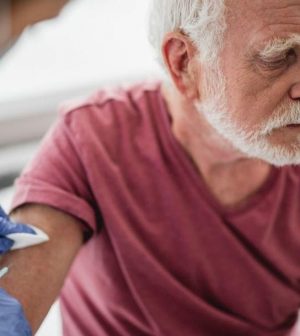- 10 Strategies to Overcome Insomnia
- Could Artificial Sweeteners Be Aging the Brain Faster?
- Techniques for Soothing Your Nervous System
- Does the Water in Your House Smell Funny? Here’s Why
- Can a Daily Dose of Apple Cider Vinegar Actually Aid Weight Loss?
- 6 Health Beverages That Can Actually Spike Your Blood Sugar
- Treatment Options for Social Anxiety Disorder
- Understanding the Connection Between Anxiety and Depression
- How Daily Prunes Can Influence Cholesterol and Inflammation
- When to Take B12 for Better Absorption and Energy
Blood Cancer Patients Could Benefit From COVID Booster Shot: Study

Patients with B-cell blood cancers who did not make antibodies to COVID-19 after two shots of vaccine may find that a third shot does the trick, new research finds.
More than half the patients who had failed to respond to the first two shots had a positive response to the third, or booster, shot, according to the Leukemia & Lymphoma Society study.
“The additional COVID-19 vaccine dose appears to be improving immune response in many people with blood cancer — one of many conditions that can suppress a person’s immune system,” said study author Dr. Gwen Nichols, chief medical officer at the society.
“However, while vaccination offers protection to the majority of blood cancer patients, some will not mount a full antibody response even with this additional dose,” she said in a society news release.
The society recommends that blood cancer patients who received two doses of the Pfizer or Moderna mRNA COVID vaccine get another dose. Guidelines have not yet been formulated for those who got the Johnson & Johnson vaccine, but the society said they too may consider another shot and should talk with their doctor.
The society’s experts also urge blood cancer patients to continue using masks and maintaining social distance. Unvaccinated patients with blood cancer tend to have more prolonged and severe COVID-19 infections including higher rates of death, according to the news release.
The study also offers insight into the effect of immune suppressing treatments on immune response.
Treatment with the antibody rituximab in the six to 12 months before vaccination was tied to a failure to produce COVID-19 antibodies, even after a third dose of the mRNA vaccines. Also, some patients being treated with Bruton tyrosine kinase (BTK) inhibitors didn’t make detectable COVID-19 antibodies.
However, current cancer treatment guidelines do not suggest pausing these treatments or delaying COVID-19 vaccination in blood cancer patients. The best path is for blood cancer patients to consult with their doctors and get vaccinated, the society said.
“Antibody levels in our study ranged from 2.2 to over 2,500,” said study co-author Lee Greenberger, the society’s chief scientific officer. “Antibodies tell us that a patient has responded to vaccination — and that is a positive finding, but vaccine experts are still working to determine exactly what antibody level is needed to protect against COVID-19 infection or its worst outcomes.”
Based on the results of this and an earlier study, it’s estimated that at least 100,000 blood cancer patients in the United States will not have antibodies after three doses of Pfizer or Moderna vaccine.
The report was published Sept. 13 in the journal Cancer Cell.
More information
For more on COVID-19 vaccines, see the U.S. Centers for Disease Control and Prevention.
SOURCE: The Leukemia & Lymphoma Society, news release, Sept. 13, 2021
Source: HealthDay
Copyright © 2026 HealthDay. All rights reserved.










